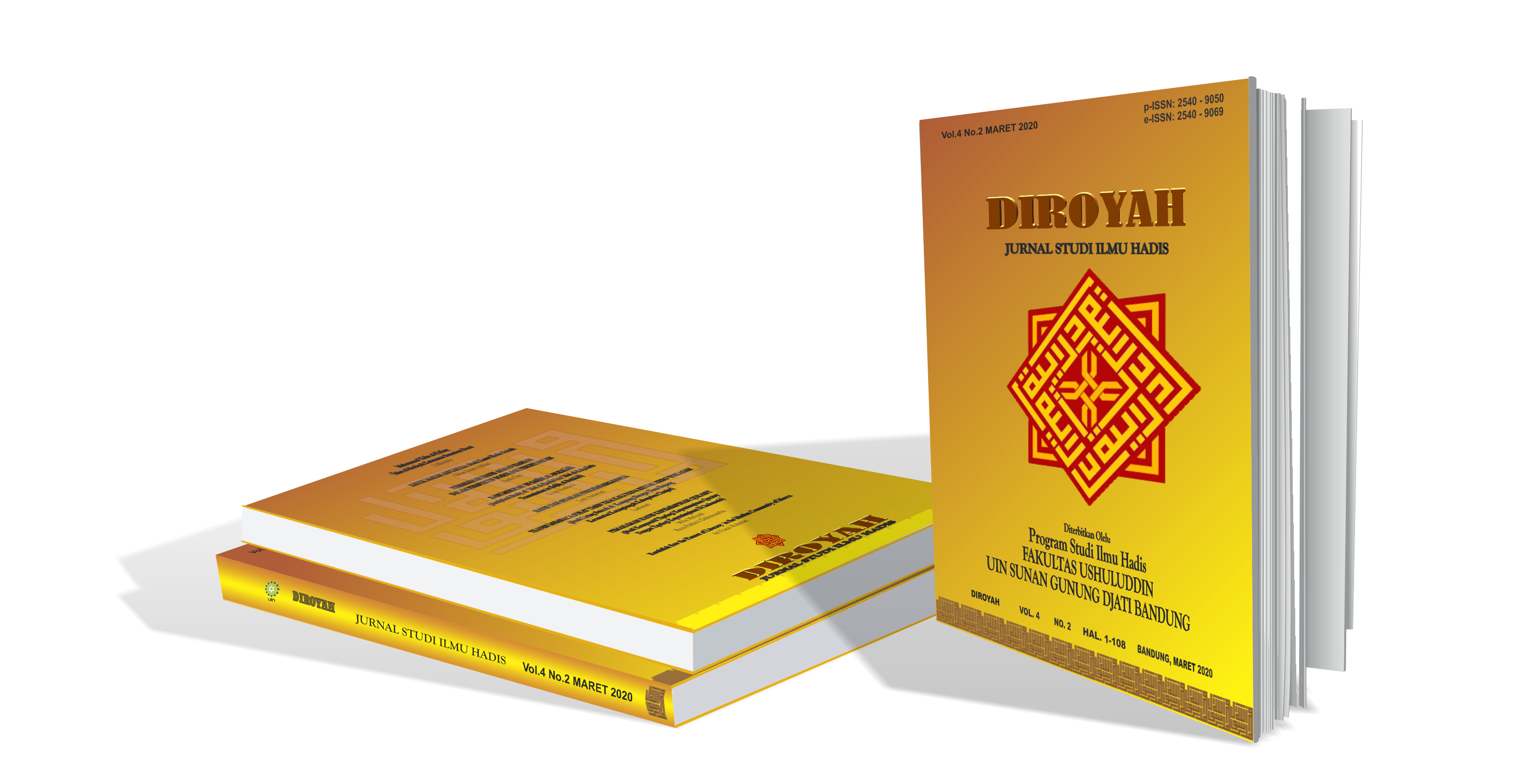Study of Criminal Hadiths and Qishash: Perspectives on Contemporary Islamic Legal Thought
Main Article Content
Abstract
Article Details
Authors who publish with this journal agree to the following terms:
- Authors retain copyright and grant the journal right of first publication with the work simultaneously licensed under a Creative Commons Attribution-NonCommercial-ShareAlike 4.0 International License that allows others to share the work with an acknowledgment of the work's authorship and initial publication in this journal.
- Authors are able to enter into separate, additional contractual arrangements for the non-exclusive distribution of the journal's published version of the work (e.g., post it to an institutional repository or publish it in a book), with an acknowledgment of its initial publication in this journal.
- Authors are permitted and encouraged to post their work online (e.g., in institutional repositories or on their website) prior to and during the submission process, as it can lead to productive exchanges, as well as earlier and greater citation of published work (See The Effect of Open Access).
References
‘Audah, A. Q. (1984). Al-Tasyri' Al-Jina'i Al-Islami, Al-Islam Wa Auda'una Al-Qanûniyyah Transl. KH. Firdaus A.N. Jakarta: Bulan Bintang.
‘Audah, A. Q. (1987). Al-Tasyri' Al-Jina'i Al-Islami, Muqaranan Bi Al-Qanun Al-Wad'i. Beirut: Mu'asasah Al-Risalah.
‘Audah, A. Q. (2024). Al-Mausu'at Al-Haditsiyah: Al-Muwatha (Vol. 2). Retrieved From Https://Dorar.Net/Hadith/Sharh/115269
Abu Zahrah, M. (N.D.). Al-Jarîmat Wa Al-’uqûbat Fi Al-Fiqh Al-Islami. Cairo: Al-Anjlu Al-Misriyah.
Al-Mawardi, Abu Hasan. (2000). Al-Ahkâmu Al-Sultâniyat [Transl. Fadhli Bahri, With The Title: Al-Ahkâmu Al-Sultâniyat, Principles Of Islamic State Administration]. Jakarta: Darul Falah.
Al-Nawawi. (N.D.). Arba'in Commentary By Sayyid Bin Ibrahim Al-Huwaiti, Syarah Hadith Al-Arba'in Al-Nawawi. Retrieved From Https://Www.Islamweb.Net
Alotaibi, H. (2021). The challenges of execution of Islamic criminal law in developing Muslim Countries: An analysis based on Islamic principles and existing legal systems. Cogent Social Sciences; 7. https://doi.org/10.1080/23311886.2021.1925413.
Al-Qarhadawi, Y. (1994). Critical Studies on Understanding Hadith. Jakarta: Islamuna Press.
Al-Qarhadawi, Y. (1996). How To Understand Islamic Shari’a. Jakarta: Islamuna Press.
Al-Sijistani, Abu Dawud Sulaiman. (1990). Sunan Abu Dawud (Vol. 3, Ed. Said Muhammad Al-Laham). Beirut: Dar Al-Fikr.
Al-Syathibi, Abu Ishaq. (2006). Al-Muwafaqath Fi Ushul Al-Syari'ah (Ed. Abdullah Darraz). Cairo: Dar Al-Hadith.
Al-Tirmidzi, M. A. I. (N.D.). Sunan Al-Tirmidzi, Kitab Diyat, Hadith No. 1326. Beirut: Dar Al-Kutub Al-Ilmiah.
Al-Zuhayli, W. (1993). Al-Qur'an Al-Karim, Bunyatuhu Al-Tasyri'iyah Wa Khashaishuhu Wal Hadariyah. Lebanon, Beirut: Dar Al-Fikr.
Al-Zuhayli, W. (1993). Ushul Al-Fiqh (Vol. 1). Lebanon, Beirut: Dar Al-Fikr.
Ash-Shiddieqy, T. M. H. (1997). The death Penalty in Islamic Shari’a. Semarang: PT Rizki Putra Library.
Aykul, A. (2022). İslâm ceza hukukunda cezaların umumiliği. Trabzon İlahiyat Dergisi (Trabzon Theology Journal), 9(1), 103-126. https://doi.org/10.33718/tid.1096264
Burlian, P. (2015). Implementation of the Concept of Qishash Punishment in Indonesia. Jaktim: Sinar Grafika.
Dermawan, B. & Harisudin, M. (2021). Transformasi Pemikiran Hukum Pidana Islam Terhadap Hukum Pidana Nasional (Analisis Implementatif Jarimah Hudûd, Qishash dan Ta’zir). 1, 251-263. https://doi.org/10.35719/RCH.V1I3.34.
Doi, Abd Al-Rahman I. (1992). The Shari’ ah Islamic Law [Transl. Wadi Masruri and Basri Iba Ashgary, Shari’ah: Basics of Islamic Law. Jakarta: Rineka Cipta.
El-Awa, M. S. (2018). Punishment in Islamic Law: A Comparative Study. American Trust Publications.
Farooq M. (2022). The application of Islamic criminal law in modern society. Journal of Islamic Studies, 23(2), 193-210.
Ibn Qayyim Al-Jauziyah. (N.D.). I'lam Al-Muwaqi'in 'An Rabb Al-'Alamin (Vol. 2). Beirut: Dar Al-Jail.
Idrus, A. M. (2019). Conception of legal protection in Islamic law. Journal of Islamic Studies, 8(2), 185-196.
Ismail, M. S. (1992). Hadith Research Methodology. Jakarta: Bulan Bintang.
Juswandi et al. (2023). The Urgency of Jurisprudence in Actualisation Islamic Law. Pena Law International Journal of Law. https://doi.org/10.56107/penalaw.v1i3.86.
Juswandi. (2022). Urgensi kaidah fikih dalam reaktualisasi hukum Islam. PENA Law: International Journal of Law, 1(3), 23-32.
Kamali, M. (2019). Crimes and punishments in Islamic law https://doi.org/10.1093/oso/9780190910648.001.0001.
Khan, A. (2019). The Application of Islamic Law in Contemporary Society. Islamic Law and Society, 26(4), 455-478.
Moeljanto. (1993). Principles of Criminal Law. Jakarta: Rineka Cipta.
Mubarak, H. (2021). The significance of hadith in the development of Islamic criminal law. Journal of Islamic Law Studies, 7(1), 45-60.
Oktatianti, T., Bin Humaid, M. S. M., Rosyadi, R. I., Abd Adzim, A. A., & Muthoifin. (2023). Premeditated murder in the modern era: A comparative study of perspectives on Islamic law and the Criminal Code. Solo International Collaboration and Publication of Social Sciences and Humanities, 1(1), 24-34. https://doi.org/10.61455/sicopus.v1i01.28
Peters, R. (2006). Crime and punishment in Islamic law: theory and practice from the sixteenth to the twenty-first century. https://doi.org/10.1017/CBO9780511610677.
Poerwadarminta, W. J. S. (1990). General Dictionary of Indonesian Language. Jakarta: Balai Pustaka.
Rohman, A. (2020). Qishash Law and Human Rights. Tawasut. https://doi.org/10.31942/ta.v7i02.5394.
Sabiq, S. (1983). Fiqh Al-Sunnah (Vol. 2). Beirut: Dar Al-Fikr.
Sharia, M. A. (2020). Contemporary Issues in Islamic Jurisprudence. Cambridge: Cambridge University Press.
Van Apeldoorn, L. J. (1996). Introduction to the Science of Law (26th ed.). Jakarta: Pradnya Paramita.
Wahiduddin Khan, Maulana. (2016). Muhammad The Prophet. Jakarta: Alvabet.
Yunus, M. (1989). Arabic-Indonesian Dictionary. Jakarta: Hidakarya Agung.
Yusuf, H., & Basri, S. (2018). Model penyelesaian alternatif perkara pidana dalam hukum Islam dan relevansinya dengan pembaharuan hukum pidana Indonesia. Legality, 26(1), 53-60.
Zainuddin, Z. (2017). The restorative Justice Concept of Jarimah Qishas In Islamic Criminal Law. 17, 335-341. https://doi.org/10.20884/1.jdh.2017.17.3.826.
Zainuddin. (2017). The restorative justice concept of jarimah qishas in Islamic criminal law. Jurnal Dinamika Hukum, 17(3), 335-341. https://doi.org/10.20884/1.jdh.2012.12.3.116
Zakariyah, L. (2015). Qawaid al-Fiqhiyyah in Islamic legal theory: A comparative study. Cambridge Scholars Publishing.
Bassiouni, M. C. (1982). The Islamic Criminal Justice System. Oceana Publications.
Bukhari, M. I. (1987). Sahih Al-Bukhari (Trans. M. Muhsin Khan). Darussalam.
Dermawan, B., & Harisudin, M. N. (2020). Transformasi pemikiran hukum pidana Islam terhadap hukum pidana nasional (Analisis implementatif jarimah hudûd, qishash dan ta’zir). Rechtenstudent Journal, 1(3), 251-263.
Ibn Sa'd, M. (1997). Kitab Al-Tabaqat Al-Kabir (Vol. 2). Dar Al-Kutub Al-Ilmiyyah.
Kamali, M. H. (2012). Principles of Islamic Jurisprudence. Islamic Texts Society.
Malik, I. A. (1997). Al-Muwatta' (Trans. Aisha Bewley). Diwan Press.
Vikør, K. S. (2005). Between God and the Sultan: A History of Islamic Law. Oxford: Oxford University Press.

